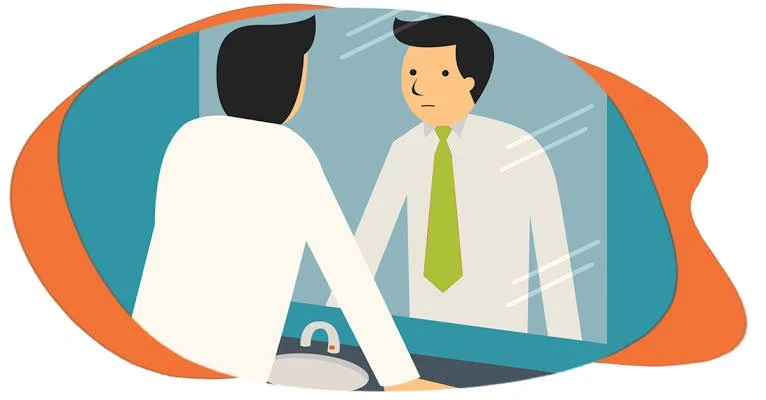What Is Self-Awareness? (And How To Increase Yours)
Self-awareness is a skill that allows you to be more conscious of your own strengths and weaknesses. Cultivating this trait will help improve your relationships and increase your productivity.
In this article, we’ll define self-awareness, why it’s important, the key benefits of being self-aware and how to develop your own.
What is self-awareness?
Self-awareness is a mindful consciousness of your strengths, weaknesses, actions and presence. Self-awareness requires having a clear perception of your mental and emotional states.
Deep and meaningful self-awareness involves recognizing:
How to react to different situations
What triggers habitual responses for you
How you relate to other people
Why you feel the way you do toward certain individuals
What your attitude is toward various topics
How you respond to other people
How other people perceive you
Self-awareness allows you to take a deeper assessment of your surroundings. For example, you may be aware that you enjoy eating in the break room, but self-awareness can help you identify the specific reasons why. With self-awareness, you might realize that you enjoy the break room because you like the company of your coworkers or that you can spend time away from your workspace.
Personal awareness means that you take the time and effort to understand yourself better so you can make informed decisions that will help you improve your life.
Why is self-awareness important?
Being more self-aware can have significant benefits in both your personal life and professional life. It can help you identify what you like about your job and how to build a successful career path that can keep you motivated and fulfilled by your work.
Benefits of self-awareness
Here are just some of the advantages of being self-aware. Self-awareness:
Improves communication skills
Enables you to process feedback more accurately
Makes you a more collaborative team player
Encourages you to self-manage your time
Leads to increased productivity
How to become more self-aware
These steps will guide you toward a greater level of self-awareness and personal understanding:
1. Find an honest partner
Enlist a friend or coworker who’s willing to work with you on your level of self-awareness. They should be able to offer thoughtful, constructive feedback you can use. A mentor can be especially useful for improving self-awareness. Your mentor can be a current or former manager, a colleague with more experience or a professor.
You should be able to meet with your partner once or twice a month to measure your progress.
2. Be open to feedback
Acknowledge that greater self-awareness requires that you listen to and accept constructive criticism. Achieving self-awareness is about examining your own obstacles. While you may be able to identify some of your own strengths and weaknesses, actively listening to an outside perspective can help you gain a more complete assessment.
3. Practice mindfulness
Mindfulness is being aware of your surroundings without imposing any personal biases. Practicing mindfulness is an important step in self-awareness, as it can help you understand how you fit into your surroundings. By paying attention to what’s happening around you, you can better see how you affect others and how others make you feel.
4. Assess your capabilities
As you improve your self-awareness, you’ll also do a better job of assessing your capabilities and choosing tasks that challenge you without exceeding your abilities. While identifying and improving upon weaknesses is an important part of self-awareness, so too is assessing and maximizing your strengths. With a high level of self-awareness, you’ll see where you can excel and where you can grow.
5. Regularly self-assess
Self-awareness is an ongoing trait you must nurture regularly. Set consistent times to reflect and measure your progress. Meet with your mentor or partner to receive additional feedback. If you’re working alone, keep a journal and assess your strengths and weaknesses regularly. Note ways you’ve improved and identify clear evidence of these improvements. Work evaluations, personality tests and aptitude tests can help you with your self-awareness.
Self-awareness examples
Here are some examples of self-awareness to help you learn more about the benefits and how it applies in the workplace:
Self-awareness in a job interview
If you have a job interview, self-awareness is a great trait to show your potential employer. Most interviewers ask about your weaknesses as a test of self-awareness, so you’ll have easy opportunities to use these tips:
Be open about your weaknesses.
Balance information about your strengths by also mentioning areas where you’d like to learn and improve.
Let your employer know about tasks that you will need extra coaching to complete.
Explain clear plans for how you intend to improve.
Self-awareness in a new job
Demonstrate self-awareness in a new job early on and you can establish this is as a personal strength and valuable skill. Others will appreciate your honesty and rely on you for balanced and reliable assessments. To demonstrate self-awareness in a new job:
Ask for coaching or training when you need it.
Admit when you’re unfamiliar with a term or process.
Share your strengths and suggest areas where you can help.
Assess where you fit best in the team and share your insights with coworkers to find the best ways to collaborate.
Self-awareness in a work evaluation
Work evaluations offer regular opportunities to increase your self-awareness. Approached correctly, these meetings can provide you with valuable information to enhance your self-awareness moving forward. To demonstrate self-awareness in a work evaluation:
Openly admit to your weaknesses and ask for advice on how to improve them.
Request training, the opportunity to attend conferences or new tools where needed to facilitate professional growth.
Assess your strengths and support these with hard facts such as marketing ROI or statistics on your productivity.


